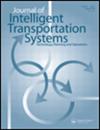Multi-head attention-based intelligent vehicle lane change decision and trajectory prediction model in highways
IF 2.8
3区 工程技术
Q3 TRANSPORTATION
Journal of Intelligent Transportation Systems
Pub Date : 2025-09-03
DOI:10.1080/15472450.2024.2341392
引用次数: 0
Abstract
With the aim to improve the interaction between intelligent vehicles and human drivers, this article proposes the MCLG (multi-head attention + convolutional social pooling + long short-term memory + Gaussian mixture model) lane change decision and trajectory prediction model, which includes a lane-changing intention decision module. The model comprises a lane change decision module responsible for determining three lane change intentions: left lane change, right lane change, and car-following. Subsequently, a multi-head attention mechanism processes complex vehicle interaction information to enhance modeling accuracy and intelligence. In addition, uncertainty in trajectory prediction is considered by using multimodal trajectory prediction and Gaussian mixture model, and diversity and uncertainty are combined by combining trajectory prediction from several different modalities through probabilistic combinatorial sampling patterns. Test results indicate that the MCLG model, based on the multi-head attention module, outperforms existing methods in trajectory prediction. The decision module, which takes interactive information into account, exhibits higher predictability and accuracy. Furthermore, the MCLG model, considering the lane-changing decision module, significantly enhances trajectory prediction accuracy, providing robust decision-making support for autonomous driving systems.
基于多头注意力的高速公路智能车辆变道决策和轨迹预测模型
为了改善智能车辆与人类驾驶员之间的交互,本文提出了 MCLG(多头注意力+卷积社会池+长短期记忆)方法。
本文章由计算机程序翻译,如有差异,请以英文原文为准。
求助全文
约1分钟内获得全文
求助全文
来源期刊
CiteScore
8.80
自引率
19.40%
发文量
51
审稿时长
15 months
期刊介绍:
The Journal of Intelligent Transportation Systems is devoted to scholarly research on the development, planning, management, operation and evaluation of intelligent transportation systems. Intelligent transportation systems are innovative solutions that address contemporary transportation problems. They are characterized by information, dynamic feedback and automation that allow people and goods to move efficiently. They encompass the full scope of information technologies used in transportation, including control, computation and communication, as well as the algorithms, databases, models and human interfaces. The emergence of these technologies as a new pathway for transportation is relatively new.
The Journal of Intelligent Transportation Systems is especially interested in research that leads to improved planning and operation of the transportation system through the application of new technologies. The journal is particularly interested in research that adds to the scientific understanding of the impacts that intelligent transportation systems can have on accessibility, congestion, pollution, safety, security, noise, and energy and resource consumption.
The journal is inter-disciplinary, and accepts work from fields of engineering, economics, planning, policy, business and management, as well as any other disciplines that contribute to the scientific understanding of intelligent transportation systems. The journal is also multi-modal, and accepts work on intelligent transportation for all forms of ground, air and water transportation. Example topics include the role of information systems in transportation, traffic flow and control, vehicle control, routing and scheduling, traveler response to dynamic information, planning for ITS innovations, evaluations of ITS field operational tests, ITS deployment experiences, automated highway systems, vehicle control systems, diffusion of ITS, and tools/software for analysis of ITS.

 求助内容:
求助内容: 应助结果提醒方式:
应助结果提醒方式:


